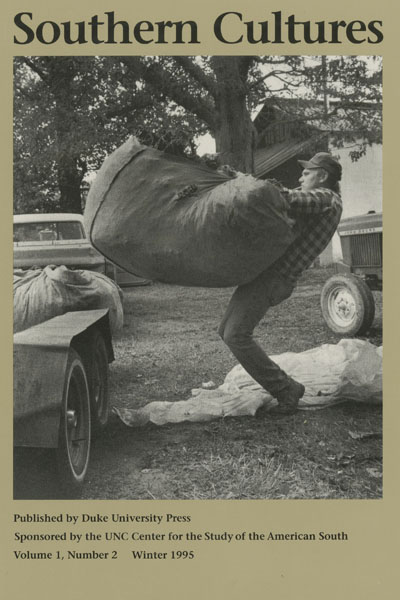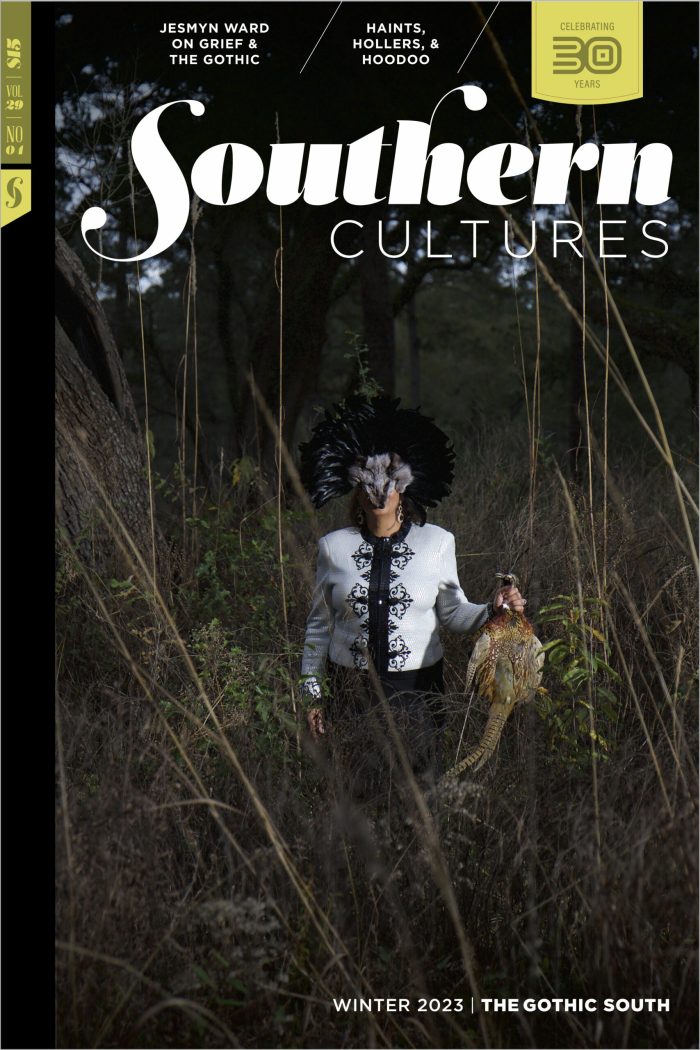by John Shelton Reed,
Harry L. Watson
“There’s plenty of cultural diversity in the American South, and you can always get a friendly argument started by trying to pronounce on who or what lies at the center of the southern cultural experience.” There’s plenty of cultural diversity in the American South, and you can always get a friendly argument started by trying »
Essay
A Short History of Redneck: The Fashioning of a Southern White Masculine Identity
by Patrick Huber
In the cotton counties along the river in Mississippi, where there are three black skins for every white one, the gentlemen are afraid. But not of the Negroes. Indeed, the gentlemen and the Negroes are afraid together. They are fearful of the rednecks . . .who in politics and in person are pressing down upon »
by John Shelton Reed
“My approach was simply to tell them exactly what I was trying to do, stating that I was helping with a study of the South and that I needed their help to show how Southerners really lived.” In the late 1940s, with support from the Rosenwald Fund and the University of North Carolina’s Institute for »
by Robert O. Stephens
“On the surface the story is about growing up in a small southern town.” During his speech to the jury at the climactic trial of Tom Robinson in Harper Lee’s To Kill a Mockingbird, Atticus Finch presents a fundamental distinction between the two forces in conflict during the rape trial—the law and the code. Tom »
Essay
Saturday Night in Country Music: The Gospel According to Juke
by Jimmie N. Rogers,
Stephen A. Smith
The American South has always been a mythic land of contrast and juxtaposition—Black and white, rich and poor, mountaineer and planter, hospitality and violence, unregulated development and a sense of place, greed and grace, illiteracy and great writing—and it remains so today. One of the more intriguing paradoxes is the image of the South as »
by Peter Filene
North Carolina Humanities Council, 1994 When the White Furniture Company of Mebane, North Carolina, was shut down in 1993, it fell victim to what social scientists call deindustrialization. To the 203 employees and their three thousand fellow townspeople, however, the event felt like a death in the family. “I coulda just cried,” said James Blalock, »
by Eric Hinderaker
Omohundro Institute of Early American History and Culture, 1992 When W. J. Cash set out more than fifty years ago to characterize southern society and culture, he chose the image of the frontier as his defining metaphor and rejected popular visions of refined and pedigreed gentlemen moving through a timeless and elegant landscape. To understand »
by Wayne K. Durrill
Oxford University Press, 1993. Between 1865 and 1876 at least 1,465 Black men held public office in the former Confederate states. They were a varied lot. Some such as U.S. Congressmen Blanche K. Bruce were well educated, articulate, wealthy, and politically well connected. Bruce and others like him are well known to American historians. Others »
by Anastatia Sims
University of South Carolina Press, 1993. It sounds like the plot of a Victorian melodrama. A woman with the improbable name of Andrew becomes addicted to narcotics and has an affair with the doctor who supplies her drugs. He persuades her to set fire to the home of one of his enemies. She is caught »
by Sarah Gordon
University of Georgia Press, 1990. At least since the publication of Sandra Gilbert and Susan Gubar’s The Madwoman in the Attic in 1979, feminist literary critics have acknowledged the temerity of a woman’s decision to seize the pen—with its obvious associations with phallocentric power—for her own use. Lucinda MacKethan adds her voice by asserting that »
by Annette C. Wright
Charles Scribner’s Sons, 1993. 556 pp. Cloth, $27.50; paper, $14.00. When asked by Southern Cultures to review this book on Coca-Cola, I was tempted to concentrate on the southern penchant for soft drinks. According to marketing experts, striking regional differences still exist in the consumption of drinks such as colas, imported beers, and “new age »
by Bennett M. Judkins
University of Kentucky Press, 1993. Labor organizing in the South has had a long and eventful, although not particularly successful, history. Early writers about the region tended to blame this failure on the workers, depicting them as docile and obedient. This was especially the case in the textile industry, where northern union leaders often cited »
by Steven F. Lawson
University of North Carolina Press, 1992. University of North Carolina Press, 1993. The struggles of Black southerners during the early 1960s aroused concerned people across America to leave the relative comfort and safety of their homes and risk their lives in the struggle for freedom. Northerners Danny Lyon and Jon Daniels ventured southward in the »
by Laurie F. Maffly-Kipp
University of Tennessee Press, 1993. Sociologists of religion have expended considerable effort in recent years trying to explain the rise of conservative evangelicalism in America since the late 1970s. Perhaps the only people not surprised by the political and social resurgence of right-wing Protestant believers are the conservatives themselves. Others, including scholars, secular bystanders, and »
by Dwight B. Billings
University of Alabama Press, 1991. The year 1986 marked the fiftieth anniversary of the Southern Sociological Society. More than just a professional association of sociologists in the South, the society was originally established to encourage the sociological study of the South and thus to contribute to regionwide processes of social evaluation, planning, and improvement. This »
by Ferrel Guillory
University of Georgia Press, 1993. As luck would have it, Hunter James began his employment at the Atlanta Journal-Constitution on the same day that Ralph McGill, the newspaper’s celebrated columnist, won a Pulitzer Prize. With excitement all around and his mind pondering the McGill legend, James had difficulty completing his assigned task of rewriting civic »
by Leo Mazow
University of Arkansas Press, 1993. Graphic Arts & the South is an important addition to a sorely neglected field of study. Substituting the breadth of a monograph with the critical focus of nine illuminating, if uneven, essays, this collection showcases the work of leading scholars in art history and American cultural history. Graphic Arts & »
by John Shelton Reed
“For as long as some people have thought of themselves as southerners, they have believed that their manners were better than (or at least different from) those of other Americans—who have, by and large, been willing to grant them that.” For as long as some people have thought of themselves as southerners, they have believed »
by David Moltke-Hansen
“The revolution is quiet, but its impact is resounding.” The revolution is quiet, but its impact is resounding. Access to the southern historical record has been expanding dramatically not only for graduate students and their professors but also for historic site interpreters, journalists, novelists, local and family historians, Civil War buffs, and others. If you’re »
by Louis D. Rubin Jr.
“We were part of its community life. But we were Jewish, and not from the old families that had fought in the Confederate War.” The earliest dream I can remember is of gateposts. A pathway in Hampton Park leads along an open area to a line of low trees and thickets. Next to and beyond »





